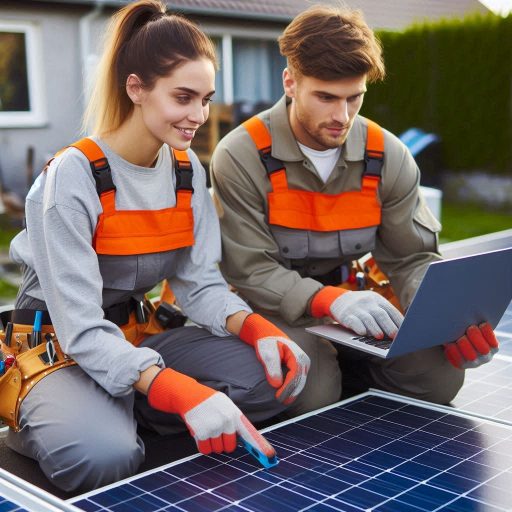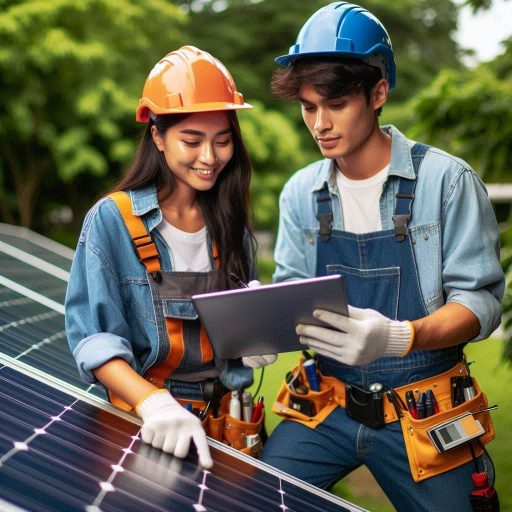Introduction
Solar PV Installer Engineer Responsibilities is pivotal in advancing renewable energy by working directly with solar power systems.
This role is crucial as solar energy becomes increasingly important in reducing dependence on fossil fuels and combating climate change.
Solar PV Installer Engineers are responsible for designing, installing, and maintaining solar photovoltaic (PV) systems.
They ensure that solar panels are installed correctly and operate efficiently, contributing to a more sustainable and eco-friendly energy future.
Their daily responsibilities are diverse and vital.
First, they assess installation sites to determine the optimal placement of solar panels.
This involves evaluating factors such as roof orientation, shading, and structural integrity.
Once the site is assessed, they design the layout of the solar array to maximize energy production and system performance.
This design phase is critical for ensuring the efficiency of the solar system.
During installation, Solar PV Installer Engineers handle the physical setup of solar panels, wiring, and mounting systems.
They ensure all components are securely installed and connected according to industry standards and safety regulations.
Precision and attention to detail are essential to avoid potential issues and ensure the system functions as intended.
Maintenance is another key aspect of their role.
Daily responsibilities of a Solar PV Installer Engineer
Installing Solar Panels on Various Roofs or Ground Mount Systems
A Solar PV Installer Engineer installs solar panels on different types of roofs and ground mount systems.
This involves evaluating the structure to ensure it can support the panels.
Engineers must secure panels to rooftops, flat surfaces, or custom-built ground mounts.
They use specialized tools and techniques to ensure stability and safety.
The installation process includes precise measurements and adjustments to fit different roof types, including pitched, flat, and metal roofs.
For ground mounts, engineers ensure the panels are securely anchored and aligned correctly.
Effective installation practices maximize the system‘s efficiency and longevity.
Connecting and Wiring Solar Panels to Inverters and Electrical Systems
Connecting and wiring solar panels to inverters and electrical systems is a critical responsibility.
Engineers must route electrical wiring from the panels to the inverter, which converts solar energy into usable electricity.
They ensure that all connections are secure and comply with electrical codes.
Proper wiring is essential for the system‘s efficiency and safety.
Engineers must also integrate the solar system with the building‘s electrical system or grid.
They verify that all connections are correctly made and that the system is safe for operation.
Attention to detail during wiring prevents future electrical issues.
Ensuring Proper Positioning and Alignment of Solar Panels
Ensuring the proper positioning and alignment of solar panels is key to optimizing sunlight exposure.
Engineers assess the site‘s orientation and angle to maximize solar energy capture.
They adjust the panels to the ideal tilt and direction based on geographical location and sun path.
Correct positioning prevents shading and ensures panels receive the most sunlight.
Engineers use tools such as inclinometers and solar path finders to achieve precise alignment.
Proper alignment improves the system‘s energy production and overall efficiency.
Testing and Troubleshooting System Components
Testing and troubleshooting system components are essential for ensuring optimal performance.
Engineers conduct thorough checks of all system parts, including panels, inverters, and wiring.
They use diagnostic tools to identify and address any issues.
Testing verifies that the system operates efficiently and safely.
Engineers must troubleshoot problems such as electrical faults, communication errors, or performance issues.
Effective troubleshooting ensures that the system performs at its best and meets quality standards.
Regular maintenance and testing help prevent future problems and ensure long-term reliability.
Basically, a Solar PV Installer Engineer‘s daily responsibilities include installing solar panels, connecting and wiring systems, ensuring proper alignment, and testing components.
Installing panels involves working on various roof types and ground mounts.
Safety precautions and protocols
Importance of Following Safety Guidelines While Working with Electrical Components
Following safety guidelines while working with electrical components is crucial for solar PV installer engineers.
Electrical work involves risks that can lead to serious injury or death if not handled properly.
Technicians must adhere to established safety protocols to prevent accidents.
This includes understanding and applying safety standards related to electrical installations.
Regularly reviewing safety procedures ensures that engineers are aware of potential hazards and can respond appropriately.
Strict adherence to these guidelines protects both the technician and the property.
Safety is paramount in avoiding electrical shocks, fires, and other dangerous incidents.
Use of Personal Protective Equipment (PPE) Like Gloves and Helmets
Using personal protective equipment (PPE) is essential for solar PV installer engineers.
PPE such as gloves and helmets provides critical protection during installations.
Gloves prevent electrical shocks and injuries from sharp objects.
Helmets protect against falling debris and impacts.
Properly fitted PPE reduces the risk of injury and enhances overall safety.
Engineers must ensure their PPE is in good condition and appropriate for the task at hand.
Regular inspections and maintenance of PPE are necessary to maintain its effectiveness.
Wearing PPE consistently is a key component of a safe working environment.
Proper Handling of Tools and Equipment to Prevent Accidents
Proper handling of tools and equipment is vital for preventing accidents.
Solar PV installer engineers must use tools according to manufacturer instructions.
They should inspect tools for damage before use and replace any defective items.
Using the right tools for the job helps avoid mishaps and ensures efficiency.
Technicians must store tools securely when not in use to prevent tripping hazards and damage.
Proper tool handling includes following safety procedures during operation and maintenance.
This practice minimizes the risk of accidents and ensures a safer working environment.
Emergency Procedures in Case of Electrical Hazards or Accidents
Engineers must be prepared with emergency procedures for electrical hazards or accidents.
Immediate response to electrical issues can prevent severe injuries and damage.
Engineers should be trained in emergency protocols, including how to shut off power sources safely.
They must know the location of circuit breakers and emergency shut-off switches.
Having a plan for quickly addressing electrical fires or shocks is essential.
Technicians should also be familiar with first aid procedures for electrical injuries.
Regular drills and training ensure preparedness and an effective response to emergencies.
Therefore, daily responsibilities for solar PV installer engineers include following safety guidelines, using appropriate PPE, handling tools correctly, and preparing for emergencies.
Adhering to safety protocols prevents accidents and injuries.
PPE like gloves and helmets protects against electrical and physical hazards.
Read: Radiologic Technologist: Work Environment Insights
Collaboration with team members
Working Closely with Project Managers, Electricians, and Other Professionals
Solar PV Installer Engineers collaborate extensively with project managers, electricians, and other professionals to ensure successful solar installation projects.
They coordinate with project managers to understand project goals, timelines, and specifications.
This collaboration ensures that the installation aligns with the overall project plan and meets all deadlines.
Engineers work with electricians to integrate electrical systems properly, ensuring that wiring and connections are safe and effective.
Coordination with other professionals, such as structural engineers and architects, may be necessary to address specific site requirements or structural considerations.
Communicating Effectively to Coordinate Tasks and Ensure Project Deadlines Are Met
Effective communication is essential for Solar PV Installer Engineers.
They regularly update project managers and team members on progress and any issues encountered.
Clear communication helps in coordinating tasks efficiently and ensures that all team members are aware of their responsibilities.
Engineers participate in meetings to discuss project updates, address concerns, and adjust plans as needed.
Timely and accurate communication helps in preventing delays and ensures that the project stays on schedule.
By keeping everyone informed, they contribute to a smooth workflow and timely project completion.
Providing Support and Assistance to Colleagues When Needed
Solar PV Installer Engineers provide support and assistance to their colleagues throughout the installation process.
They may help with tasks beyond their specific role, such as troubleshooting technical issues or handling equipment.
This support ensures that the team can address challenges quickly and maintain productivity.
Engineers may assist less experienced team members by offering guidance or training on specific tasks.
Their willingness to help fosters a collaborative work environment and enhances the overall efficiency of the team.
Sharing Knowledge and Expertise with Team Members to Improve Overall Performance
Sharing knowledge and expertise is a key responsibility for Solar PV Installer Engineers.
They actively mentor and train team members, sharing insights on best practices and industry standards.
By doing so, they help improve the skill levels of their colleagues and enhance the team’s overall performance.
Engineers may lead workshops or provide on-the-job training to ensure that everyone is up-to-date with the latest technologies and techniques.
This sharing of knowledge contributes to the professional development of the team and supports high-quality work.
In review, Solar PV Installer Engineers play a crucial role in coordinating and supporting solar installation projects.
They work closely with project managers, electricians, and other professionals to ensure successful project completion.
Read: Interview Tips for Aspiring Radiologic Technologists
Customer Interactions
Interacting with Clients to Understand Their Needs
A solar PV installer engineer interacts closely with clients to understand their specific needs and preferences.
They conduct detailed consultations to gather information about the client’s energy goals and preferences.
This interaction helps tailor the solar installation to meet the client’s requirements.
Engineers listen carefully to clients’ concerns and expectations regarding the installation.
Clear communication ensures that both parties have a shared vision for the project.
Understanding client needs is crucial for designing an effective and satisfactory solar energy system.
Providing Recommendations for Optimal Solar Panel Placement
Based on client interactions and site assessments, engineers provide recommendations for the optimal placement of solar panels.
They consider factors such as sunlight exposure, roof angle, and shading.
Engineers use their expertise to suggest the best locations for panel installation to maximize energy efficiency.
Their recommendations are based on technical calculations and site evaluations.
Proper panel placement is essential for achieving the highest performance and energy production.
Engineers ensure that the proposed layout meets both technical and aesthetic requirements.
Transform Your Career Today
Unlock a personalized career strategy that drives real results. Get tailored advice and a roadmap designed just for you.
Start NowAddressing Customer Concerns and Answering Questions
Engineers address any customer concerns and answer questions about the installation process throughout the project.
They provide clear explanations of how the installation will proceed and what to expect.
Addressing concerns helps build trust and ensures clients are informed about each step.
Engineers clarify technical details and provide solutions to any issues that arise.
Effective communication helps prevent misunderstandings and ensures clients are comfortable with the process.
Their responsiveness to questions contributes to a positive customer experience.
Ensuring Customer Satisfaction with High-Quality Work
Ensuring customer satisfaction is a top priority for solar PV installer engineers.
They deliver high-quality work by adhering to industry standards and best practices.
Engineers focus on precision and thoroughness in every aspect of the installation.
They conduct final inspections to verify that the system operates correctly and meets client expectations.
Providing excellent service includes addressing any post-installation issues promptly and effectively.
High-quality workmanship and exceptional service contribute to overall customer satisfaction and positive referrals.
Read: CAD Technician vs. Draftsman: Key Differences

You Might Also Like: Best Practices for Database Monitoring and Maintenance
Maintenance and monitoring duties
Conducting Regular Inspections of Solar Panels and System Components
A solar PV installer engineer‘s daily responsibilities include conducting regular inspections of solar panels and system components.
They visually and technically assess the condition of solar panels to detect any issues.
Engineers check for physical damage, dirt buildup, and signs of wear.
They inspect electrical connections, inverters, and mounting systems to ensure everything functions correctly.
Regular inspections help in identifying malfunctions early and preventing system downtime.
Engineers use diagnostic tools and software to monitor performance and detect anomalies.
By maintaining a rigorous inspection schedule, engineers ensure that solar systems operate efficiently and safely.
Performing Routine Maintenance Tasks
Routine maintenance is a key responsibility for solar PV installer engineers.
They clean solar panels to remove dirt, debris, and obstructions that could impact performance.
Engineers tighten bolts and fasteners to ensure that panels and other components remain securely in place.
They replace faulty parts such as inverters or connectors as needed.
Routine checks include verifying the integrity of wiring and electrical connections.
Engineers follow maintenance schedules and manufacturer guidelines to perform these tasks.
Effective maintenance helps in extending the lifespan of the solar system and maintaining optimal energy production levels.
Monitoring Energy Production Levels and System Performance
Monitoring energy production levels and system performance is crucial for solar PV installer engineers.
Engineers track the amount of energy generated by the solar panels and compare it with expected performance metrics.
They use monitoring systems to analyze data on energy output, efficiency, and operational status.
Engineers identify trends and patterns that might indicate performance issues or inefficiencies.
Regular performance monitoring allows engineers to pinpoint areas for improvement and address potential problems before they escalate.
This continuous oversight ensures that the solar system operates at peak efficiency and delivers the expected energy output.
Implementing Upgrades or Adjustments
Implementing upgrades or adjustments to solar systems is a significant responsibility for engineers.
They analyze performance data to determine if system enhancements are necessary.
Engineers may upgrade software, replace outdated components, or adjust panel angles for better sunlight exposure.
They implement technological advancements to improve system efficiency and reliability.
Engineers coordinate with other professionals to ensure that upgrades are installed correctly and safely.
By making these adjustments, engineers help in optimizing the solar system‘s performance and adapting to new technologies or changing conditions.
Their work enhances the overall effectiveness and longevity of solar installations.
Generally, solar PV installer engineers perform a range of daily responsibilities to ensure optimal system performance.
They conduct regular inspections, perform routine maintenance, monitor energy production, and implement upgrades.
These tasks are essential for maintaining the efficiency and reliability of solar systems.
Through diligent work, engineers help maximize energy production and extend the life of solar installations.
Read: Best Online Courses for CAD Technician Training
Administrative Responsibilities
Keeping Detailed Records of Installation Projects
Keeping detailed records is crucial for a Solar PV Installer Engineer.
Accurate documentation of installation projects helps track progress and ensure quality.
Engineers record materials used, including types and quantities of solar panels, inverters, and mounting hardware.
They also document work hours to monitor project timelines and labor costs.
This information is vital for maintaining transparency and providing clients with a clear overview of the project.
Completing Paperwork and Permits
Completing paperwork and obtaining necessary permits is a fundamental responsibility.
Solar PV Installer Engineers must ensure all required permits are secured before beginning installation.
This includes zoning permits, electrical permits, and any other local or state-required documentation.
Properly completed paperwork ensures compliance with regulations and helps avoid legal issues.
It also helps streamline the inspection process, facilitating a smoother project completion.
Communicating Project Updates and Progress Reports
Effective communication is key in managing solar installation projects.
Engineers regularly update supervisors and clients on project status and progress.
They report on milestones, any issues encountered, and adjustments made.
Clear communication helps manage expectations and keeps everyone informed about project developments.
It also facilitates prompt decision-making and problem-solving, ensuring the project stays on track.
Managing Inventory of Tools, Equipment, and Supplies
Managing inventory is essential for the efficiency of installation work.
Engineers oversee the tools, equipment, and supplies needed for each project.
This includes ensuring that all necessary items, such as drills, wrenches, and safety gear, are in good working condition.
They track inventory levels to prevent shortages and ensure that replacements are ordered promptly.
Proper inventory management minimizes delays and ensures that installations proceed smoothly.
In summary, the daily responsibilities of a Solar PV Installer Engineer encompass several critical tasks.
Keeping detailed records ensures transparency and quality control.
Completing paperwork and securing permits are essential for regulatory compliance and smooth project execution.
Regular communication with supervisors and clients keeps everyone informed and helps address issues promptly.
Managing inventory effectively supports the efficiency and success of installation projects.
Each of these responsibilities contributes to the overall effectiveness and professionalism of a Solar PV Installer Engineer.
Conclusion
The daily responsibilities of a Solar PV Installer Engineer encompass a wide range of tasks that are crucial for the effective deployment of solar energy systems.
They begin with conducting detailed site assessments to determine the best locations and conditions for solar installations.
This involves evaluating roof structures, shading issues, and electrical systems to ensure compatibility with solar technology.
The engineer then proceeds to design and plan solar PV systems tailored to each specific site.
They oversee the installation process, ensuring that all components, from panels to inverters, are correctly installed and functioning as intended.
Regular maintenance and troubleshooting are also key aspects of their role, as they ensure the long-term efficiency and reliability of solar systems.
This role is incredibly important in the renewable energy industry.
Solar PV Installer Engineers drive the growth of solar power, a crucial element in reducing greenhouse gas emissions and promoting sustainable energy solutions.
Their work directly contributes to the transition from fossil fuels to cleaner, renewable energy sources.
For those considering a career in this field, the role of a Solar PV Installer Engineer offers numerous opportunities.
[E-Books for Sale]
The Big Book of 500 High-Paying Jobs in America: Unlock Your Earning Potential
$19.99 • 500 High-Paying Jobs • 330 pages
Explore 500 high-paying jobs in America and learn how to boost your career, earn more, and achieve success!
See All 500 High-Paying Jobs of this E-Book
1001 Professions Without a Degree: High-Paying American Jobs You Can Start Now
$19.99 • 1001 Professions Without a Degree • 174 pages
Discover 1001 high-paying jobs without a degree! Unlock career tips, skills, and success strategies for just $19.99!




